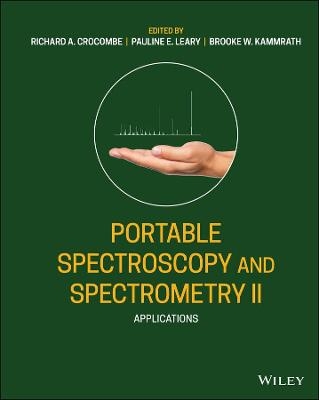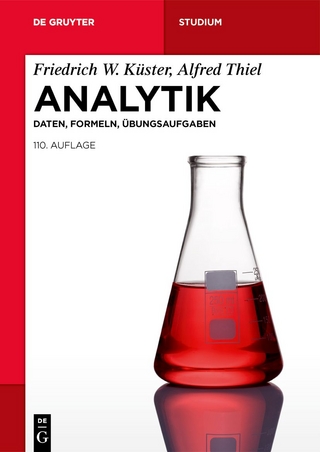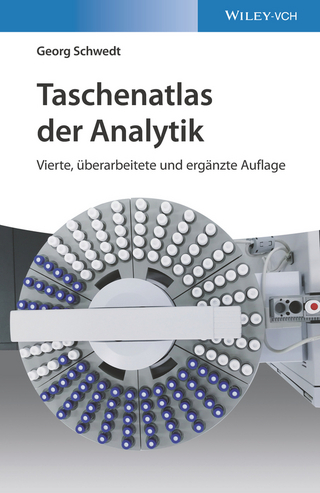
Portable Spectroscopy and Spectrometry, Applications
John Wiley & Sons Inc (Verlag)
978-1-119-63640-3 (ISBN)
Portable Spectroscopy and Spectrometry: Volume Two is an authoritative and up-to-date compendium of the diverse applications for portable spectrometers across numerous disciplines. Whereas Volume One focuses on the specific technologies of the portable spectrometers themselves, Volume Two explores the use of portable instruments in wide range of fields, including pharmaceutical development, clinical research, food analysis, forensic science, geology, astrobiology, cultural heritage and archaeology.
Volume Two features contributions by a multidisciplinary team of experts with hands-on experience using portable instruments in their respective areas of expertise. Organized both by instrumentation type and by scientific or technical discipline, 21 detailed chapters cover various applications of portable ion mobility spectrometry (IMS), infrared and near-infrared (NIR) spectroscopy, Raman and x-ray fluorescence (XRF) spectroscopy, smartphone spectroscopy, and many others. Filling a significant gap in literature on the subject, the second volume of Portable Spectroscopy and Spectrometry:
Features a significant amount of content published for the first time, or not available in existing literature
Brings together work by authors with assorted backgrounds and fields of study
Discusses the central role of applications in portable instrument development
Covers the algorithms, calibrations, and libraries that are of critical importance to successful applications of portable instruments
Includes chapters on portable spectroscopy applications in areas such as the military, agriculture and feed, hazardous materials (HazMat), art conservation, and environmental science
Portable Spectroscopy and Spectrometry: Volume Two is an indispensable resource for developers of portable instruments in universities, research institutes, instrument companies, civilian and government purchasers, trainers, operators of portable instruments, and educators and students in portable spectroscopy courses.
RICHARD A. CROCOMBE PhD, operates Crocombe Spectroscopy Consulting, served as the 2020 President of the Society for Applied Spectroscopy (SAS), and is Chair of the SPIE ‘Next-Generation Spectroscopic Technologies’ conference. He has 40 years of experience in the analytical instrumentation business. For the last 15 years, he has specialized in miniature and portable spectrometers. PAULINE E. LEARY, PhD, is a Reachback Chemist at Federal Resources where she specializes in miniature and portable spectrometers and instrument platforms. For over 15 years, she has been training users, including field scientists, emergency responders, and conventional and specialized forces of the United States military, on the theory and operation of portable systems. Pauline has presented on portable instruments at conferences and technical symposia throughout the world. BROOKE W. KAMMRATH, PhD, is the Assistant Director of the Henry C. Lee Institute of Forensic Science and an Associate Professor in the Forensic Science Department of the Henry C. Lee College of Criminal Justice and Forensic Sciences at University of New Haven. She also serves as a scientific consultant and expert witness for both criminal and civil cases. She served as the President of the New York Microscopical Society (NYMS) from 2017-2019, is on the Governing Board of the Eastern Analytical Symposium (EAS), and is a Diplomate of the American Board of Criminalistics (ABC).
List of Contributors xv
Foreword xix
Preface for Volume 2 xxi
Acknowledgements xxiii
1 The Role of Applications in Portable Spectroscopy 1
Richard A. Crocombe, Pauline E. Leary and Brooke W. Kammrath
1.1 Introduction 1
1.2 The Evolution of Applications 1
1.3 What Defines an Application? 5
1.4 The Return on Investment for an Application 11
1.5 Preparing Samples in the Field 12
1.6 The Commercial Success of a Portable Spectrometer 15
1.7 Conclusions and Future Applications 16
References 17
2 Identification and Confirmation Algorithms for Handheld Analyzers 19
Craig M. Gardner, Robert L. Green, Lin Zhang, Lisa M. Lee and Suzanne K. Schreyer
2.1 Introduction 19
2.2 Data Collection 22
2.3 Data Conditioning 26
2.4 Types of Algorithms 26
2.5 Display of Algorithm Results 34
2.6 Computational Considerations 37
2.7 Performance Characterization 39
2.8 Conclusion 40
References 40
3 Library and Method Development for Portable Instrumentation 43
Suzanne K. Schreyer
3.1 Introduction 43
3.2 Instrument Use Overview 44
3.3 Library Development 45
3.4 Qualitative Model Development 48
3.5 Library Build 48
3.6 Case Study: Building a Polymorph Library 50
3.7 Case Study: Counterions and Effect on Selectivity 51
3.8 Case Study: Effect of Moisture on Peaks of Ammonium Nitrate 53
3.9 Case Study: Selectivity in an Explosive Sublibrary 54
3.10 Quantitative Method Development 55
3.11 Building Meaningful Predictive Models 58
3.12 Case Study: Prediction of Protein Levels in Flour Samples 58
3.13 Summary 61
References 62
4 Applications of Portable Optical Spectrometers in the Chemical Industry 65
Xiaoyun Chen, Mark A. Rickard and Zhenbin Niu
4.1 Introduction 65
4.2 Review of Industrial Applications 67
4.3 In-Depth Examples 71
4.4 Conclusions and Prospects 80
References 82
5 The Value of Portable Spectrometers for the Analysis of Counterfeit Pharmaceuticals 85
Pauline E. Leary, Richard A. Crocombe and Ravi Kalyanaraman
5.1 Introduction 85
5.2 Field Analytical Spectroscopy Methods 93
5.3 Deployed Systems 112
5.4 The Future 116
Acknowledgments 117
References 118
6 Forensic Applications of Portable Spectrometers 125
Brooke W. Kammrath, Pauline E. Leary and John A. Reffner
6.1 Breath Alcohol Testing 127
6.2 White-Powder Attacks 131
6.3 Illicit Drugs 134
6.4 Counterfeit Drugs 137
6.5 Explosives 138
6.6 Clandestine Labs 139
6.7 Ignitable Liquids 139
6.8 Future 140
6.9 Conclusions 142
Acknowledgments 143
References 144
7 Military Applications of Portable Spectroscopy 149
Alan C. Samuels
7.1 Introduction 149
7.2 Visible/Near-Infrared Hyperspectral Imaging for Bulk Explosive Material Detection and Camouflage Defeat Applications 150
7.3 Infrared Spectroradiometry for Remote Hazardous Vapor Detection and Early Warning 150
7.4 Infrared and Raman Spectroscopy for Condensed Phase Analysis (Energetics, Chemical Agents, Biological Agents) 151
7.5 Raman Spectroscopy for Surface Contamination Detection 153
7.6 Raman Spectroscopy for Presumptive Biological Hazard Classification and Early Warning of a Biowarfare Agent Attack 154
7.7 Fluorescence Spectroscopy as a Biological Detection “Trigger” 154
7.8 Networked Multimodal Sensors and Data Analytics and the Future 155
References 156
8 Applications of Ion Mobility Spectrometry 159
Pauline E. Leary and Monica Joshi
8.1 Introduction 159
8.2 Applications 162
8.3 Conclusion 174
References 175
9 Portable Spectroscopy in Hazardous Materials Response 179
David DiGregorio
9.1 The Hazmat Clinician 179
9.2 Defining the Mission: Meeting with the IC 180
9.3 Hazmat Huddle or Pre-Entry Brief 183
9.4 HPMS 190
9.5 Raman Spectroscopy 190
9.6 Fourier-Transform Infrared Spectroscopy (FT-IR) 191
9.7 IMS 191
9.8 GC–MS 192
9.9 Colorimetrics 193
9.10 Warranties and Reachback 193
9.11 Pitfalls 194
9.12 Complimentary Technologies 194
9.13 An Introduction to the ScientificWorking Group for the Analysis of Seized Drugs (SWGDRUG) 194
9.14 SWGDRUG Recommendations: How They Related to the Hazmat Field 195
9.15 Ancillary Equipment 196
References 198
10 Toward Clinical Applications of Smartphone Spectroscopy and Imaging 199
William J. Peveler and W. Russ Algar
10.1 Smartphone Imaging and Spectroscopy Capabilities: An Overview 200
10.2 Clinical Biomarkers Targeted for the Smartphone 203
10.3 Toward Clinical Applications of the Smartphone in Low-Cost and Point-of-Care Settings 207
10.4 Toward Clinical Applications in Primary Care or Pathology Laboratory Settings 211
10.5 Microscopy and Imaging on the Smartphone and the Potential Clinical Applications 218
10.6 Optical Measurements with Smartphones in the Clinic: An Outlook 219
References 221
11 Applications of Portable and Handheld Infrared Spectroscopy 227
John A. Seelenbinder and Christina S. Robb
11.1 Rapid Response 228
11.2 Dispersed Samples 231
11.3 Nondestructive Testing 238
11.4 Conclusion 243
References 243
12 Spectra Transfer Between Benchtop Fourier-Transform Near-Infrared and Miniaturized Handheld Near-Infrared Spectrometers 249
Uwe Hoffmann, Frank Pfeifer and Heinz W. Siesler
12.1 Introduction 249
12.2 Experimental Details 255
12.3 Results and Discussion 256
12.4 Summary of Transfer Strategy 262
12.5 Conclusions 265
References 265
13 Applications of Handheld Near-Infrared Spectrometers 267
Hui Yan and Heinz W. Siesler
13.1 Introduction 267
13.2 Instrumentation 267
13.3 Applications 269
13.4 Qualitative Applications of Handheld NIR Spectrometers 269
13.5 Quantitative Analyses with Handheld NIR Spectrometers 276
13.6 Conclusions 294
Acknowledgments 295
References 295
14 X-Ray, LIBS, NMR, and MS Applications in Food, Feed, and Agriculture 299
Krzysztof Bernard Be´c, Justyna Grabska and Christian Wolfgang Huck
14.1 Introduction 299
14.2 Applications of Transportable Spectroscopy and Spectrometry in Food, Feed, and Agriculture 301
14.3 Current Developments, Remaining Challenges, and Future Prospects 317
14.4 Concluding Remarks 319
References 319
15 Portable Near-Infrared Spectroscopy in Food Analysis 325
Ellen V. Miseo, Felicity Meyer and James Ryan
15.1 Introduction 325
15.2 Spectroscopy 326
15.3 Analysis, Sampling, and Detection Limits 327
15.4 Use of Portable Near-Infrared Instruments in Food Analysis 332
15.5 Summary 336
References 336
16 Handheld Raman, SERS, and SORS 347
Michael Hargreaves
16.1 Introduction 347
16.2 Raman Spectroscopy: Sampling Techniques, Technologies, and Considerations 347
16.3 Handheld Raman Devices 350
16.4 Sample Considerations 351
16.5 Usability Considerations 352
16.6 Surface-Enhanced Raman Spectroscopy (SERS) 352
16.7 Spatially Offset Raman Spectroscopy (SORS) 355
16.8 Standoff 358
16.9 Technology Combinations 358
16.10 Leveraging Data 359
16.11 Military Identification Applications 361
16.12 Pharmaceuticals 364
16.13 Narcotics 366
16.14 Novel Psychoactive Substances (NPS) 369
16.15 Summary 372
Acknowledgments 372
Images 372
References 372
17 Portable Raman Spectroscopy in Field Geology and Astrobiology Applications 377
H.G.M. Edwards, J. Jehliˇcka and A. Culka
17.1 Introduction 377
17.2 Dawn of Portable Raman Spectrometers 378
17.3 Conclusions 393
Acknowledgement 395
References 395
18 Hyperspectral Proximal Sensing Instruments and Their Applications for Exploration Through Cover 401
Carsten Laukamp, Monica LeGras and Ian Christopher Lau
18.1 Introduction 401
18.2 Field VNIR-SWIR Sensors 402
18.3 Field and Laboratory Fourier Transform Infrared Spectrometers 406
18.4 Hyperspectral Drill Core Sensing 408
18.5 Data Processing 408
18.6 Applications 412
18.7 Summary 416
Acknowledgements 418
References 418
19 Handheld X-Ray Fluorescence (HHXRF) 423
Stanislaw Piorek
19.1 Introduction – X-Ray Fluorescence 423
19.2 How DidWe Get Here – Evolution of a Handheld XRF Analyzer 425
19.3 Contemporary HHXRF Analyzer: Construction and Operation 427
19.4 Calibration Methods 433
19.5 The Most Important Applications for HHXRF Analyzers 436
19.6 Remarks on Safety When Using HHXRF 448
19.7 Summary and Possible Future Developments for HHXRF 448
References 449
20 XRF and LIBS for Field Geology 455
Bruno Lemiere and Russell S. Harmon
20.1 Introduction 455
20.2 X-Ray Fluorescence Spectroscopy (XRF) 457
20.3 Laser-Induced Breakdown Spectroscopy (LIBS) for Field Geology 471
20.4 Current Potential and Future Developments of Field-Portable XRF and LIBS 486
References 490
21 Portable Spectroscopy for Cultural Heritage 499
Federica Pozzi, Adriana Rizzo, Elena Basso, Eva Mariasole Angelin, Susana França de Sá, Costanza Cucci and Marcello Picollo
21.1 Introduction 499
21.2 Instrumentation 501
21.3 Applications to Cultural Heritage Research 503
21.4 Conclusions 516
Acknowledgments 516
References 517
22 Portable Spectroscopy for On-Site and In Situ Archaeology Studies 523
Mary Kate Donais and Peter Vandenabeele
22.1 Introduction 523
22.2 Molecular and Vibrational Spectroscopic Analysis 524
22.3 Atomic Spectroscopic Analysis 527
22.4 Case Study – Characterization of a Multiphased Stone Tower in Monterubliaglio, Umbria (Italy) by Portable X-ray Fluorescence Spectrometry 530
22.5 Conclusions 537
Acknowledgements 538
References 538
23 The Future of Portable Spectroscopy 545
Richard A. Crocombe
23.1 Introduction 545
23.2 Optical Spectroscopy 545
23.3 General Technology Improvements 546
23.4 Raman Spectrometers 548
23.5 XRF and LIBS 549
23.6 GC-MS and LC-MS 550
23.7 Ion Mobility Spectrometry (IMS) and High-Pressure Mass Spectrometry (HPMS) 550
23.8 NMR (Relaxometry, or Time-Domain NMR) 551
23.9 Hyphenation 551
23.10 Smartphone Spectrometers 552
23.11 Spectrometers Embedded in Consumer Goods 553
23.12 Spectrometers Marketed Directly to Consumers 555
23.13 Emerging Applications for Portable Spectrometers 557
23.14 Portable Hyperspectral Imaging 559
23.15 Biological Analyzers 560
23.16 Algorithms, Databases, and Calibrations 560
23.17 Conclusions 561
Acknowledgements 561
References 562
Index 573
| Erscheinungsdatum | 07.05.2021 |
|---|---|
| Reihe/Serie | Portable Spectroscopy and Spectrometry |
| Verlagsort | New York |
| Sprache | englisch |
| Maße | 211 x 257 mm |
| Gewicht | 1542 g |
| Themenwelt | Naturwissenschaften ► Chemie ► Analytische Chemie |
| ISBN-10 | 1-119-63640-X / 111963640X |
| ISBN-13 | 978-1-119-63640-3 / 9781119636403 |
| Zustand | Neuware |
| Informationen gemäß Produktsicherheitsverordnung (GPSR) | |
| Haben Sie eine Frage zum Produkt? |
aus dem Bereich


